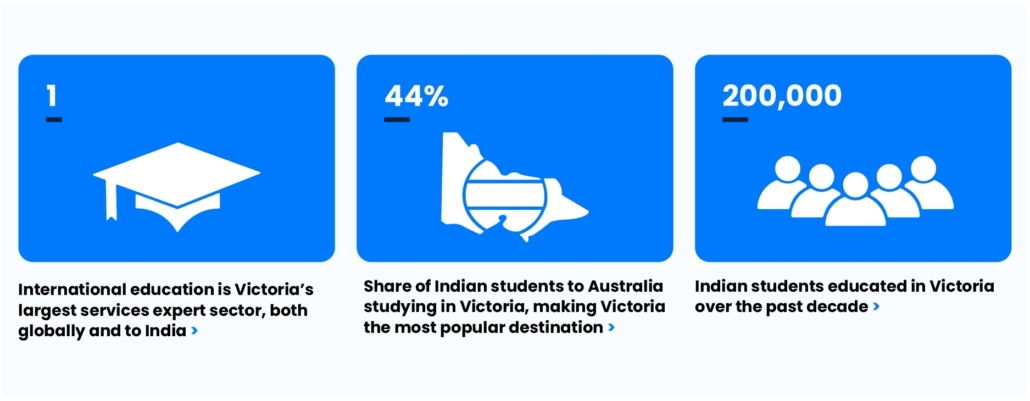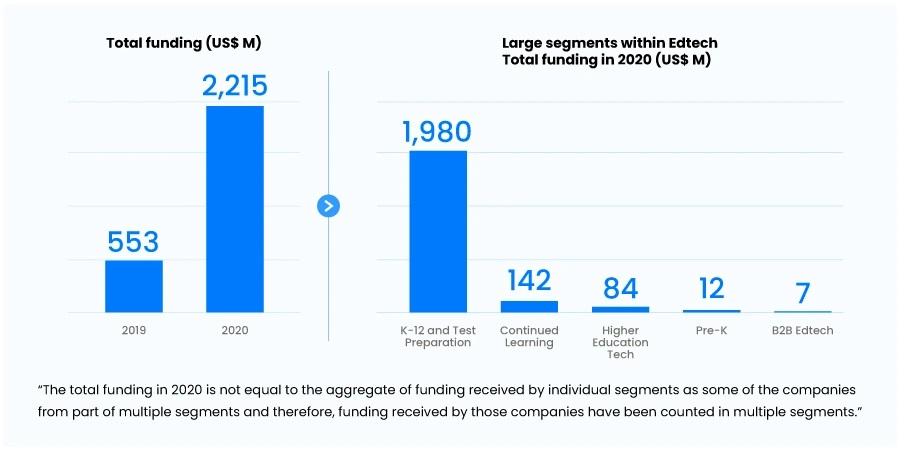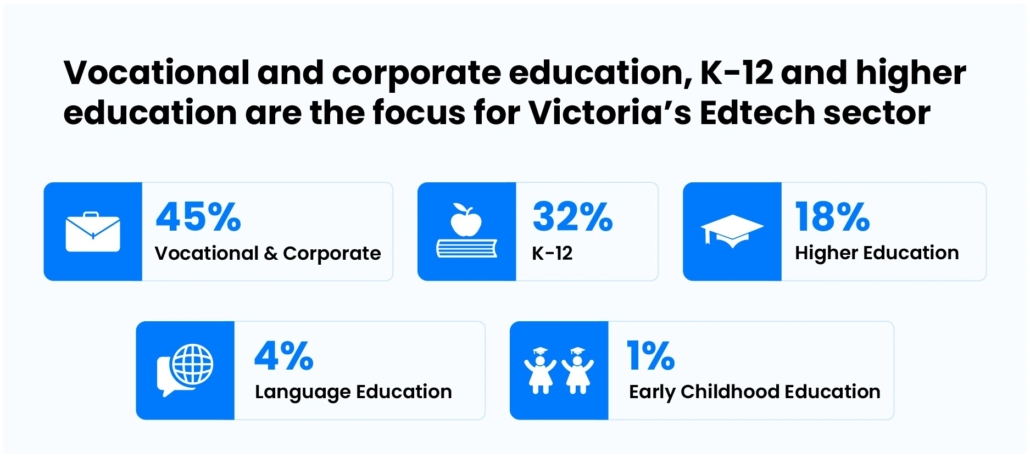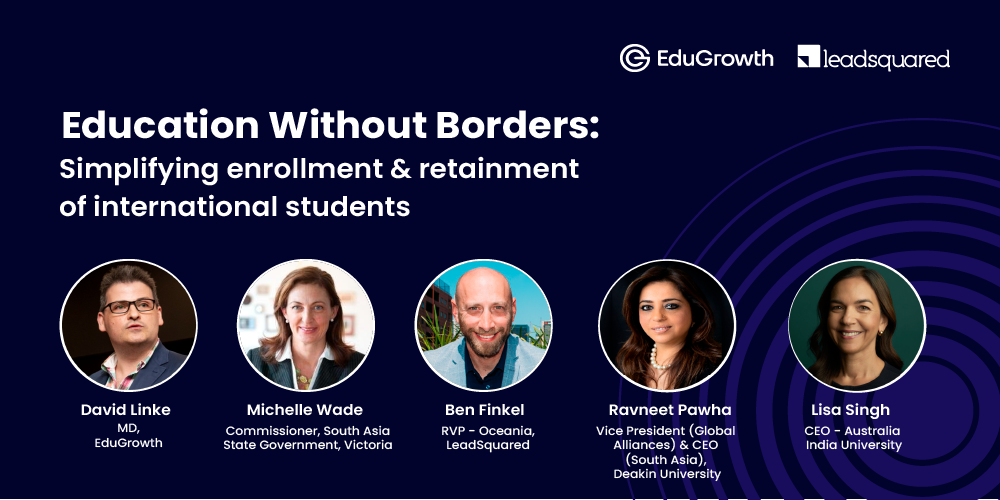Recently, we assembled a panel of notable industry and government leaders to discuss global expansion strategies for educational institutions.
- Lisa Singh, CEO, Australia India Institute
- Michelle Wade, Commissioner, South Asia State Government, Victoria
- Ravneet Pawha, Vice President (Global Alliances) & CEO (South Asia), Deakin University
- David Linke, Managing Director, EduGrowth
- (Moderator) Ben Finkel, RVP, Oceania, LeadSquared
It was a vigorous discussion with lots of insightful comments. You may read the highlights from the webinar or watch it in its entirety above.
On a global scale, Australian education is well regarded and in demand. This is Australia’s chance to help people get a great education, no matter where they are, thanks to the widespread availability of fast Internet access around the world.
Through this session, we aim to look at partnerships between government, education, and technology sectors, and explore innovations in the international education sector. We will also investigate the scope of expansion in technology partnerships.
What are some of the associations or partnerships helping organizations go international?
David Linke: It is interesting to think about the connection between Australia and such an incredibly large economy like India, which is home to some of the largest EdTechs in the world.
Global Victoria has a fantastic network of education services managers across the world. The current partnership can help build economic connections between Victoria and India. People with deep experience like Edugrowth, Global Victoria University and Australian news can really help in building those Partnerships.

Lisa Singh: The Institute (Australia India Institute) helps edtech startups connect with the Indian market by hosting round tables and conducting research. LeadSquared can provide excellent advice to newcomers in Australia and India. However, you need to know what you want to achieve with education before you can identify which organizations can help you.
Ravneet Pawha: EdTech will play a big role in developing countries like India by providing more upskilling opportunities than just university degrees or certifications.
How can one go about collaborating with institutions and technology companies?
David Linke: EdTech can provide value to countries by upskilling people in short-term programs, which many edtech companies have been doing very successfully.
You can move into formal pilot programs and bring along researchers into that conversation. There have been decades of investment by institutions like Deakin into building strong brands with fantastic partnership models.
Ravneet Pawha: There are many things to consider when starting a business, such as market demand, pricing products, and quality control. Accreditation is also an important factor to consider, as it can be complex and difficult to get. But it is possible to overcome these challenges and create a successful business. If you don’t take the risk at the right time, you may not be going on the right path to the future.”
Michelle Wade: Collaboration is key to a company’s success, especially when they are trying to scale up. Big companies like Tata and Reliance have many fidelity programs that offer bonuses and other perks, so they are worth keeping an eye on.
“Google Reliance is a big gaming platform, and they are already moving into the edtech space. This means that they’ll look for partners in the future who can help promote their products.”
Michelle Wade, Commissioner, South Asia State Government, Victoria
Lisa Singh: Ravneet was discussing how to find the balance between quality and price when it comes to lifelong learning. This is relevant to India because it has made lifelong learning a part of its National Education policy. Micro-credentials are one example of how technology and lifelong learning can be used together.
Micro-credential courses are delivered remotely through digital technology, making it easy for people to update their learning and get new skills. This is important because it gives people the opportunity to enjoy changes in the economy and the impact of covid-19.
How do we involve parents and other groups and enable them to be part of lifelong learning and participation?
“The future of classroom and office communication lies in the happy medium of online communication. Many schools are introducing technology to young learners through higher education and corporate responsibility.”
Ben Finkel, RVP, Oceania, LeadSquared
Ravneet Pawha: The micro-credential and undergraduate degree can be completed online, without the student having to travel to Australia. This saves money and allows students to stay in their home country. Technology is used extensively in both the micro-credential and degree, providing students with the skills they need for the future.
David Linke: Parents are important in education decisions because they can guide their children to pathways that will be beneficial for them. Technology is making it easier for parents to see how their children’s learning is connected to the workforce.
Michelle Wade: Quality is an important factor to consider when looking at 4,000 startups in India. This is also a global trend that many companies are considering when entering the market.
“The challenge for education providers is that they will need to appeal to a more discerning audience. Over the next few years, only the best providers will survive.”
Michelle Wade, Commissioner, South Asia State Government, Victoria

How can technology partners assist institutions in expanding education across national boundaries?
Lisa Singh: Edtech can help universities to operate, teach and educate despite pandemics. It gives universities the tools to deliver quality learning opportunities, but the quality of online learning is an important issue.
Universities in Australia and India are concerned about supporting students studying online to increase student engagement. To do this, they need to work with edtech to address issues such as online assessment, privacy concerns, and plagiarism. Also, they need to be aware of access issues, such as lack of internet connectivity and affordability.
Tech companies usually focus on the commercial space, while universities want to build bilateral ties, foster cultural understanding, and advance democracy. However, these interests can conflict or work together to look at business models that work for both.
David Linke: There is a potential conflict between edtech leaders who build big businesses and those who are focused on education, but the conflict is not just about enabling technology.
“The best way to enter the market is to connect with people who have done it before. The Victoria State Government, Australia supported EduGrowth, and delivered the Innovation Exchange a couple of years ago. This was done to connect tech entrepreneurs with educators.”
David Linke, Managing Director, EduGrowth
How to access research for business idea development?
David Linke: We are testing some models that show these connections. A great example is the EdTech Innovation Alliance with Global Victoria. This has connected nine Victorian edtech companies with a range of Victorian education providers and International Education providers.

Learners, employers and education providers can profit from EdTech, including:
- Supporting and enhancing student learning outcomes.
- Increasing student retention and engagement.
- Facilitating large-scale assessment solutions.
- Increasing administrative function efficiency and cutting expenditure.
- Promoting ongoing education.
Closing Remarks
Ravneet Pawha: There is a huge opportunity in the EdTech space in India. Institutions and companies should explore collaboration to provide products and services to people all over the world.
“Hybrid models of education, teaching, and lifelong learning will be the future.”
Institutions need to partner with companies that provide services in India to not only start looking at the Indian market, but also to look at other parts of the world. This will help with the integration of digital learning across different segments of institutions and employers using big data predictive. By doing this, they will be able to address quality drop-offs.
Reach out to us if you’d like to learn more about how we assist leading EdTech companies like BYJU’S, Unacademy, Upgrad, CrackVerbal, and others with their sales processes and strategies.
Book a Demo to talk to our EdTech consultants.
Speakers

David Linke
Managing Director, EduGrowth

Michelle Wade
Commissioner, South Asia State Government, Victoria

Ravneet Pawha
Vice President (Global Alliances) & CEO (South Asia), Deakin University

Lisa Singh
CEO, Australia India Institute

Ben Finkel
RVP, Oceania, LeadSquared









